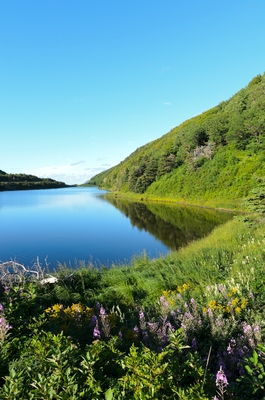My first job, selling sundries the summer I was 12 to the cottagers and campers who flocked to Cape Breton’s fabled Mira River, was about as far from the language business as you can get. Yet a few days in, I learned a humbling linguistic lesson.
Three times the customer bellowed his order across the counter to the slack-faced prepubescent that was me: “A Pepsi pap, a baar and a boonabrayed.” Each time, all but the Pepsi eluded me. At last my supervisor interjected: the man wanted a Pepsi, a chocolate bar and a bun of bread. Comprehension did not dawn. What, like a hamburger bun? With the contempt that only a 14-year-old in a position of power can summon, my supervisor tossed me what I had always called a loaf.
And there it was, a truth that shone bright as that supervisor’s red hair: despite growing up in Cape Breton, I still hadn’t mastered the language.
 It was a dialect I’d been immersed in since age three, when my family moved to the island from Regina. I passed every school day with Cape Bretoners, crossed paths with Cape Breton neighbours, bought cream sodas from Cape Breton gas station attendants. I knew that “I seen Dougald yesterday” meant the speaker saw Dougal; “Youse’re gettin’ a fillum in science” meant we’d be watching a movie in science class; “Yer ma’s right pissed” meant my mother was very angry. But my mother had grown up in Vancouver; my father, though a Caper, had spent most of his adult life in Saskatchewan; and my older siblings were Prairie kids through and through. We didn’t speak Cape Breton at home, so my vocabulary was riddled with holes.
It was a dialect I’d been immersed in since age three, when my family moved to the island from Regina. I passed every school day with Cape Bretoners, crossed paths with Cape Breton neighbours, bought cream sodas from Cape Breton gas station attendants. I knew that “I seen Dougald yesterday” meant the speaker saw Dougal; “Youse’re gettin’ a fillum in science” meant we’d be watching a movie in science class; “Yer ma’s right pissed” meant my mother was very angry. But my mother had grown up in Vancouver; my father, though a Caper, had spent most of his adult life in Saskatchewan; and my older siblings were Prairie kids through and through. We didn’t speak Cape Breton at home, so my vocabulary was riddled with holes.
To complicate matters, Cape Breton English, shaped by the island’s Scottish and Irish settlers, is, like its better-known cousin Newfoundland English, not a single dialect at all. It’s a collection of expressions and accents that vary by region. That’s why I’d been broadsided by boonabrayed.
Still, there is a shared lexicon. Here are 10 Cape Bretonisms you’ll encounter from Glace Bay to Gabarus:
- How’s she goin’, b’y? Literally, “How are things going, boy?” Not limited to boys. Arguably the best-known, most-mimicked Cape Breton expression. Locally, used mostly in self-parody.
- Right: Adverb meaning very or so. “Archie’s right good on that fiddle.”
- Some: Equivalent to right. “That neighbour a yours is some strange, wha?”
- Wha? Interjection; the Cape Breton equivalent of eh.
- Stunned: Dim-witted, obtuse. “Youse kids are some stunned.”
- Youse: Plural of you. Not unique to Cape Breton, but ubiquitous there.
- Never’d: Did not, never did. “Hector says I went and ate all the oatcakes, but I never’d.”
- To be + after: To indicate past or habitual action. “Mary was after givin’ him holy hell for them awful directions.” “Toronto’s so big, people are after getting lost there.”
- Dear: Term of address used for just about anyone, whether beloved or not. “See ya later, dear.” “Look, dear, quit gawkin’ and just give me a boonabrayed.”
- From away: Hailing from anywhere other than Cape Breton. From-away status can last a generation or more. “That stunned Peck girl’s after moving here from away.”
Cape Bretoners, can you add to this list? Readers from away, do you recognize any of these expressions?
A special “thank you, dear” to EAC member and current Cape Bretoner Patricia MacDonald, who reviewed this article for accuracy.
The Editors’ Weekly is the official blog of the Editors’ Association of Canada. Contact us.
Discover more from L'HEBDOMADAIRE DES RÉVISEURS
Subscribe to get the latest posts sent to your email.
